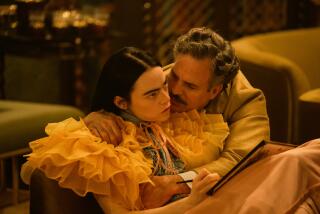MOVIE REVIEW : ‘Shame’: A Down Under Rabble-Rouser
- Share via
The Australian movie “Shame” (opening Friday citywide) is the most effective no-holds barred rabble-rouser since the films of the late Phil Karlson, director of potent B pictures from “The Phoenix City Story” to “Walking Tall.”
Like Karlson, director Steve Jodrell and his writers Beverly Blankenship and Michael Brindley are adept at showing a community becoming caught up in an increasingly violent conflict. “Shame,” which also recalls “The Wild One” in its depiction of a town under siege, is reminiscent of the AIP biker pictures of the ‘60s that managed to play off social comment against strong action elements. Yet “Shame” not only is uniquely Australian in flavor but also the first film to deal so directly with the country’s bedrock male chauvinism. In doing so, it reveals the relationship between sex and violence, Australian style, and the dark side of the amiable macho Crocodile Dundee archetype.
More mythology than sociology (which is why it works so well), the film stars vibrant Deborra-Lee Furness as Asta Caddell, a big-city barrister stranded in a remote Western Australian town while awaiting for parts to repair her motorcycle. In jeans and black leather jacket, the redheaded, sexy, confidently striding Asta makes a strong impact on the town’s male population, fathers and sons alike. They’re at once attracted to Asta and threatened by her as a well-educated, sharp-tongued and fully liberated woman. The fathers back off, but inevitably their sons, with too much beer and too much time on their hands, grow ugly in their behavior.
What they don’t reckon with is that they’ve taken on a Mad Maxine, for Asta is not only capable of defending herself but becomes concerned with the plight of a teen-age girl (Simone Buchanan) who has been raped by six local youths. Dare she press charges in a town that is already branding her a slut and could retaliate by boycotting her father’s service station? “Shame” is as adroit at pointing up the role of economics in a single-factory town, run by a condescending, iron-willed grande dame whose son is one of the rapists, as it is in revealing the psychology of the majority of the community’s women. They are so brainwashed in accepting male supremacy that they tell themselves that rape is something that’s better denied or hushed up.
As volatile as “Shame” gets, its makers themselves never lose control and move so swiftly there’s neither time nor the inclination to question its credibility. For all its growing violence and tension, the film does not fall into the familiar trap of exploiting what it is ostensibly condemning. Blunt and angry, “Shame” (appropriately rated R) has the mesmerizing effect of a stick of dynamite set off by a slow fuse.
More to Read
Only good movies
Get the Indie Focus newsletter, Mark Olsen's weekly guide to the world of cinema.
You may occasionally receive promotional content from the Los Angeles Times.










